Electrophysiology Study
We use electrophysiology studies to examine your heart's electrical system and detect abnormal heart rhythms. Learn what you need to know for your EP study.
What is an Electrophysiology Study?
An Electrophysiology (EP) study is a test that shows how electrical signals move in pathways through your heart. When the pathway is normal, your heartbeat is regular. When these signals are abnormal, your heartbeat is irregular. An irregular heartbeat is called an arrhythmia. An arrhythmia's symptoms differ for each person; they can include a pounding or rapid heartbeat, a heart "flutter," dizziness, lightheadedness, or shortness of breath.
How Is an Electrophysiology Study Performed?
An EP study usually takes around 1-2 hours to complete.
- You will be given a mild sedative to help keep you relaxed throughout the procedure.
- A sheath (short plastic tube) will be placed into a blood vessel. You may feel some pressure at first.
- The doctor will move one or more catheters (thin, flexible tubes) through a vein to your heart. You won't feel this.
- The doctor uses a special X-ray to see the catheter as it moves through your body. The catheters contain tiny sensors that measure how electrical signals move through your heart.
- The doctor may use a catheter to cause a temporary irregular heartbeat. Measurements taken during this period help your doctor understand what is causing the irregular heartbeat, where it starts, and the best way to treat it.
Before Your Procedure
- Make a list of all your current medicines and give it to your doctor.
Write down everything you are taking, including over-the-counter drugs, inhalers, patches, vitamins, herbal remedies, or street drugs. - Tell your doctor if you are allergic to any medications or dyes.
- Follow your doctor's directions about taking your medications.
If you take an anticoagulant (blood thinner), you may need to stop taking it before the procedure. If you take diabetes medications, you may need to change when you take them before and after the procedure. - Follow all instructions on when to stop eating and drinking before the procedure.
This will help prevent any complications with the sedative given before your procedure. - Arrange for a ride.
You will need a responsible adult to take you home afterward and stay with you for some time after the procedure.
After the Procedure
In the hospital:
- You will be moved to a recovery room where nurses can monitor your heart rate rhythm.
- Your leg may be numb or weak for a short while. Special steps will be taken to make sure you’re safe when you first get up.
- You will need to lie quietly for 2 to 4 hours. You may be asked to use a bedpan rather than getting up to use the toilet at first.
- During the first 48 hours, you may have a heartbeat that feels strange at times. This is common as your heart muscle adjusts to the new heartbeat.
- Before you go home, you will be provided with detailed instructions regarding home care by the healthcare team.
At home:
- Watch for swelling or bleeding at the catheter site, as well as for shortness of breath or swallowing problems. You will have bruising. This is normal.
- Tell your doctor if you feel fatigue or chest discomfort that is severe or that continues beyond the first few days.
- Avoid bending or squatting. Don’t do any intense activity such as climbing stairs, running, or lifting anything over 8 pounds.
- Take short walks of 5 to 10 minutes, several times a day.
- Use a mild laxative to relieve constipation.
- Care for the catheter site:
- Don’t take a bath, use a hot tub or swimming pool, for the first week following your procedure, or until the wound is closed and your doctor says it’s okay.
- You may take a shower after 24 hours, but avoid spraying water directly at the incision site.
- If the incision site is directly sealed with a special closure device, ask your doctor about the device and what you should watch for.
After 48 hours:
- Your doctor will tell you when it’s okay to go back to work. This will depend on your physical condition and the nature of your job.
- Take all medications exactly as prescribed by your doctor, even after you feel better. Go to all follow-up appointments so your doctor can check your heart.
Photo Gallery
Video Gallery
Testimonials
Photo Gallery
Discover awe-inspiring transformations in our "Before and After" gallery, showcasing the remarkable impact of cardiovascular surgery on our patients' health and well-being.
ALL
Currently no images available
When Should I Call My Doctor?
Call your doctor if you have any of these symptoms.
- A fever of 101° F or more
- Redness, swelling, drainage, bleeding, or severe pain near the catheter site
- Coldness or numbness in your arm or leg
- Severe tiredness that continues
- Difficulty swallowing or eating
- Fainting, light-headedness, or dizziness
- Very fast or slow heartbeat
- Shortness of breath
- Swelling in your hand or ankles
Call 911 if you have chest discomfort that is severe or is not relieved by medicine for chest pain.
Meet Your New Jersey
Cardiovascular Providers
Our team of providers, researchers, and patient care specialists are experts in cardiovascular best practices and lifesaving heart and vein care.
In Search of Care? Request a Consultation Today
Please fill out the form below to explore your options for care and get your questions answered:

THH Locations
Explore the map below to see our locations and find the clinic most convenient for you!









